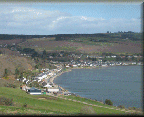Avoch is a village and parish. The name Avoch means the “field of the stream” and could derive from the Gaelic for ford or shallow water. Avoch burn, once described as “the largest stream in Ardmeanach” (the Black Isle) rises within the parish and was the home of the red trout in 1793; however by 1891 the red trout had given way to the brown variety. Avoch burn flows into the Moray Firth at Henrietta Bridge and used to have enough power to drive three corn mills and a woollen carding mill. The Suddie Burn, Goose Burn, Killen Burn and the Burn of Shaltrie all flow into it.
Avoch has always been a fishing village, though farming has also been part of its history. Farming in the 18th century was poor and only started to improve with the industrialisation of the 19th century. “….farming is only in a state of infancy” (Statistical Account for 1792).

In the picture above, buildings which have long gone can be seen to advantage; left to right, the miller’s house, the meal mill, Geddes mill (the wool factory and its chimney stack), Toll Farm, and to the extreme right, the tower of the old Free Church (now a house). Avoch burn is in the foreground.
Avoch’s main exports have been quite naturally the fish the villagers caught and the salmon nets made mostly from foreign hemp by the villagers of Seatown in Avoch. Also exported was grain, wood, some cattle, and barrels were cured here for exportation. Hemp was raised by the farmers and made into sails for the Avoch fishing fleet and there was a boat builder here as late as 1930. Flax was also raised on the crofts and spun at home, as well as, of course, some wool. There was a thriving trade in shoemaking which fell away between 1755 and 1792 owing to the harsh tax on leather. However the nine shoemakers in Avoch in 1792 had multiplied to 26 by 1840. Avoch’s imports were coal, iron, lime, bone dust (fertilizer) cloth, whisky and salt.
In 1891 Avoch had a railway station, and a post office under Inverness, with money order, savings bank and telegraph departments, one inn, a woolen mill, a brewery, a pier, two schools and three churches. Avoch was in the presbytery of Chanonry and synod of Ross. Its minister’s income was £282 per annum.

